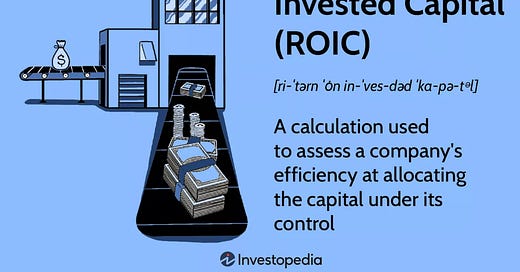Thursday's Tips: Warren Buffett on the Art of Patience
"Someone's sitting in the shade today because someone planted a tree a long time ago." - Warren Buffett
Good Morning, Value Seekers!
Welcome back to our continuing deep dive into value investing - the time-tested strategy of finding overlooked gems trading below their intrinsic worth.
Think of it like scouring thrift shops to discover vintage Levi's jackets priced at a fraction of what they should be. But instead of second-hand stores, you're searching the vast market for stocks the crowd has underestimated.
Our mission today is to equip both seasoned and rookie investors alike with the essential tools to become savvy value vultures. Identifying the bargains that others pass up.
So grab some coffee, put on your bargain hunting cap, and let's reveal what real value looks like in this market. We'll uncover the metrics, principles, and mindsets that can guide you to underpriced opportunities.
Ready to start adding true value to your portfolio? Dive in!Todays Value
Book Review
Company Breakdown
Investor Spotlight
Investors Tips
Cost Of Debt To Capital
Book Review
One Up on Wall Street
Book by John Rothchild and Peter Lynch
In his engaging investing guidebook "One Up on Wall Street," legendary mutual fund manager Peter Lynch outlines his approach of using bottom-up stock research to find lucrative growth stocks long before they appear on Wall Street's radar.
Lynch provides a masterclass in how an average investor can gain an edge by deeply understanding companies, rigorously researching opportunities, and spotting emerging growth stories before the crowd. He argues convincingly that with dedication and patience, amateurs can pick stocks just as effectively as Wall Street professionals.
The book brims with Lynch's clever anecdotes and real-world case studies illustrating how he discovered oversized winners for Fidelity's Magellan Fund. By mining his own experiences like investigating new products in stores and keeping tabs on company developments through friends and colleagues, Lynch was able to consistently identify standout stocks very early on.
While some examples are dated, the core ethos of ignoring short-term noise, focusing on long runway growth, and spotting shifts early remains highly relevant for investors today. One criticism is that Lynch's active stock trading style requires more dedication than many retail investors may possess. Nonetheless, his emphasis on turning over rocks and finding emerging opportunities that Wall Street misses provides an insightful mindset for those looking to gain an advantage.
Overall, One Up on Wall Street remains one of the most entertaining and educational books on bottom-up investing. Lynch convinces retail investors they can compete with the suits by doing superior research and boldly investing in compelling growth stories very early.
Company Breakdown
Ticker: CROX
Price: $99
P/E Ratio: 9.17
EV/EBITDA: 7.47
MKT Cap: 6.025B
10 Year Median ROIC: 9.2%
Summary:
Crocs (Nasdaq: CROX) is a footwear brand that is best known for its iconic resin clog design featuring ventilation ports and heel straps. Founded in 2002, Crocs quickly became a major footwear trend with its colorful, lightweight, and odor-resistant clog shoes.
Crocs makes money in a few key ways:
Shoe sales - The core of Crocs' business is the manufacturing and sales of its proprietary closed cell resin shoe products. This includes sales from croslite material clogs, sandals, flats, wedges, loafers, sneakers, and boots.
Wholesale channels - Crocs sells its shoes at wholesale prices to various retail partners like department stores, specialty shops, and online retailers. This provides a high volume of sales.
First party retail - Crocs also sells its shoes directly to customers through its company owned stores and website at retail price points, allowing it to capture more profit per shoe.
Licensing and partnerships - Crocs licenses its shoe designs and brand to partner companies that create custom tailored versions of Crocs shoes. Recent partnerships include Hidden Valley Ranch and KFC.
The company has focused on restructuring efforts in recent years to improve profitability. Key measures include reducing discounts, emphasizing more full-priced selling, closing underperforming stores, and increasing the average unit price of shoes. This has led Crocs to substantial revenue and profit growth since 2017.
Investor Spotlight
Charlie Munger is an American investor, businessman, and philanthropist. He was born on January 1, 1924, in Omaha, Nebraska. Munger is best known for his association with Warren Buffett and Berkshire Hathaway, where he has served as vice-chairman since 1978.
In his early career, Munger practiced law and later transitioned to real estate development before entering the world of investing. He was a co-founder of the investment firm Blue Chip Stamps, which later merged with Berkshire Hathaway.
His investing philosophy, like Buffett's, is deeply rooted in the concept of value investing. He is recognized for his focus on intrinsic value, patience, discipline, and avoiding investments outside his circle of competence.
Munger is also known for his sharp wit and wisdom, often sharing his insights about business and investing through memorable quotes and aphorisms. His speeches and writings, particularly his famous talk on "The Psychology of Human Misjudgment," are widely followed in the investment community.
In addition to his business pursuits, Munger is a notable philanthropist, donating millions of dollars to educational institutions and other charitable causes.
Investing Tips ROIC
ROIC or Return On Invested Capital is a critically important financial metric that measures how efficiently a company uses capital to generate profits.
And Warren Buffett's long-time business partner Charlie Munger has famously stated that "Over the long term, it’s hard for a stock to earn a much better return than the business which underlies it earns.
If the business earns six percent on capital over forty years and you hold it for forty years, you’re not going to make much different than a six percent return—even if you originally buy it at a huge discount.
Conversely, if a business earns eighteen percent on capital over twenty or thirty years, even if you pay an expensive looking price, you’ll end up with a fine result."
This gets at why Munger and Buffett believe ROIC is perhaps the single most important financial metric in evaluating stocks.
It gives the clearest measure of the inherent capacity of a business to generate sustainble profits from its capital base. Companies that consistently produce high returns on invested capital are compounding machines - able to smartly reinvest profits into fueling higher earnings and stock prices over time.
Munger is saying not to get caught up in whether you buy a stock cheaply or not. Far more important is buying a company with the ability to continually produce high ROIC. If the business operates efficiently, earning 18% ROIC for decades, your long-term returns will be stellar even if you overpay a bit for the stock.
Whereas a business earning just 6% returns on capital will make you a pretty pedestrian return over time, no matter how little you pay for its shares.
So the hunt for extraordinary businesses starts with finding those generating unusually high ROIC.
This identifies companies with durable competitive advantages and excellent management teams - two of the most essential ingredients to compound wealth.
Cost Of Debt To Capital
We always value your thoughts, questions, and feedback on the content provided. Please don't hesitate to reach out with any comments, questions, or topics you'd like to see covered in future editions of our newsletter.
We are committed to providing you with relevant and insightful content, and your input is invaluable in helping us achieve this goal.
If you know someone - be it a friend, family member, or colleague - who might benefit from our newsletter, we encourage you to share it with them. Our goal is to create a community of informed and engaged investors, and every new reader helps us to do just that.
Thank you for your ongoing support and involvement. Your engagement is what makes this community so unique and valuable!
Best regards,
Value Vultures







